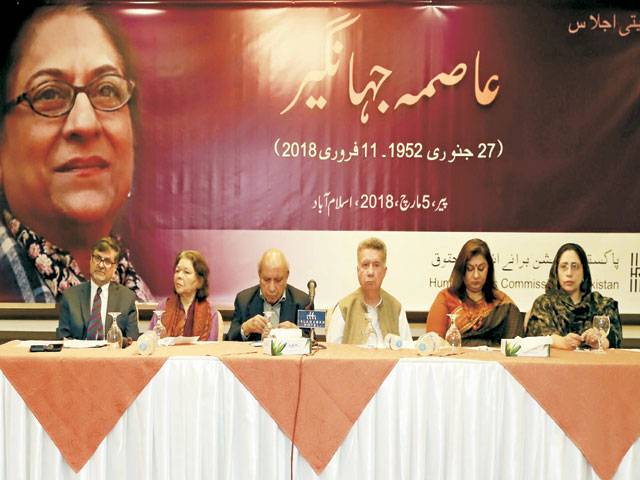Islamabad - An event titled ‘Memorial reference for Asma Jahangir’ to commemorate the late human rights activist, was held at a local hotel here on Monday. The event organised by Human Rights Commission of Pakistan was attended by a large number of people from all walks of life.
Speakers at the event included Senator Afrasiab Khattak, Justice Tariq Mehmood, director of the Gender Studies Department at Quaid-e-Azam University Farzana Bari, retired army officer and political commentator Talat Masood, journalist and activist Marvi Sirmed among several others.
In the first part of the memorial, panelists spoke at length about their associations with Asma Jahangir as well as her accomplishments. Farzana Bari said that she is at a loss of words to describe what a great human being Asma was and that her death has created an intellectual and moral vacuum in the country which is hard to fill. She praised Asma for being a champion of democracy, freedom of speech, and the rule of law. Afrasiab Khattak said that Asma was among the few who laid the foundation of human rights movement in Pakistan. She felt that it is the duty of every informed citizen to be political.
“Asma was the first to raise voice against the 1999 coup by General Musharraf and term the arrest of Nawaz Sharif unlawful and unconstitutional,” he said. Admiring her efforts to seek justice for the downtrodden members of society, Khattak said that Asma dedicated her life fighting for the oppressed.
He further said that Asma led the lawyers’ movement but also opposed judicial tyranny when necessary.
Television anchorperson, Naseem Zehra narrated stories of Asma’s school days at Convent of Jesus and Mary.
“Asma challenged authority since she was a teenager,” she asserted.
She said it was unfortunate that certain sections of the media vilified Asma and the cause for which she stood. She respected Asma Jehangir for being a genuine patriot because, despite threats to her life, Asma vowed never to leave the country. Her work and struggle raised the profile of Pakistan on international platforms.
Calling Asma a pillar of strength for the poor and neglected, Analyst Talat Masood said that her foremost quality was her strength of conviction. He said that he had the highest regard for Asma as a person because she truly connected with the subjugated segments of society.
Talat stressed that Asma was the most outstanding lawyer in the country, because of her courage. He further added that Asma was not against the military establishment; rather she was against tyranny and oppression.
“Supremacy of the rule of law was the central theme of all her speeches,” Talat claimed.
HRCP Secretary General, I.A Rahman in his keynote address said that Asma Jahangir was a political dynamo whose understanding and analysis of Pakistan’s legal issues was unparalleled. Adding that her political antenna was very sensitive, IA Rahman said that Asma Jahangir could connect the dots and predict the course of action in Pakistan’s politics before others. Asma was an icon whose services for the country will always be remembered. The speakers pointed out that Asma’s greatest legacy is that she changed the landscape of human rights activism in the country. They commended her for being an inspiration to the younger generations.
The second part of the memorial reference consisted of a panel discussion which included Pakistan People’s Party leader Farhatullah babar, renowned poet and columnist Haris khalique, and president of the Awami Workers Party’s Punjab Executive Committee Asim Sajjad. The panellists discussed how to carry forward the mission of Asma Jahangir of creating reconciliation between the civilian government and the military establishment. Farhatullah Babar pointed out that there is an illusion of freedom of expression in the country because the freedom was actually under threat from the ideology brigade in the name of faith and security.






